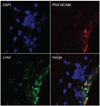Update on the functional biology of Lrrk2
- PMID: 19225574
- PMCID: PMC2643425
- DOI: 10.2217/14796708.3.6.669
Update on the functional biology of Lrrk2
Abstract
The etiology of Parkinson's disease (PD) was long thought to be due to environmental factors. Following the discovery of autosomal-dominant mutations in the α-synuclein gene, and later recessive mutations in the DJ-1, Parkin and PINK-1 genes, the field of PD genetics exploded. In 2004, it was discovered that mutations in the PARK8 locus - leucine-rich repeat kinase 2 (LRRK2, Lrrk2) - are the most important genetic cause of autosomal-dominant PD. Lrrk2 substitutions also account for sporadic PD in certain ethnic populations and have been shown to increase the risk of PD in Asian populations. Drug therapies targeting Lrrk2 activity may therefore be beneficial to both familial and sporadic PD patients, hence understanding the role of Lrrk2 in health and disease is critical. This review aims to highlight the research effort concentrated on elucidating the functional biological role of Lrrk2, and to provide some future therapeutic perspectives.
Figures




Similar articles
-
[Clinical molecular genetics for PARK8 (LRRK2)].Brain Nerve. 2007 Aug;59(8):839-50. Brain Nerve. 2007. PMID: 17713120 Review. Japanese.
-
Leucine-Rich Repeat Kinase (LRRK2) Genetics and Parkinson's Disease.Adv Neurobiol. 2017;14:3-30. doi: 10.1007/978-3-319-49969-7_1. Adv Neurobiol. 2017. PMID: 28353276 Review.
-
Leucine-rich repeat kinase 2 (LRRK2) interacts with parkin, and mutant LRRK2 induces neuronal degeneration.Proc Natl Acad Sci U S A. 2005 Dec 20;102(51):18676-81. doi: 10.1073/pnas.0508052102. Epub 2005 Dec 13. Proc Natl Acad Sci U S A. 2005. PMID: 16352719 Free PMC article.
-
Biochemical and molecular features of LRRK2 and its pathophysiological roles in Parkinson's disease.BMB Rep. 2010 Apr;43(4):233-44. doi: 10.5483/bmbrep.2010.43.4.233. BMB Rep. 2010. PMID: 20423607 Review.
-
A common leucine-rich repeat kinase 2 gene mutation in familial and sporadic Parkinson's disease in Russia.Eur J Neurol. 2007 Apr;14(4):413-7. doi: 10.1111/j.1468-1331.2007.01685.x. Eur J Neurol. 2007. PMID: 17388990
Cited by
-
Human LRRK2 G2019S mutation represses post-synaptic protein PSD95 and causes cognitive impairment in transgenic mice.Neurobiol Learn Mem. 2017 Jul;142(Pt B):182-189. doi: 10.1016/j.nlm.2017.05.001. Epub 2017 May 6. Neurobiol Learn Mem. 2017. PMID: 28487191 Free PMC article.
-
Deletion of the WD40 domain of LRRK2 in Zebrafish causes Parkinsonism-like loss of neurons and locomotive defect.PLoS Genet. 2010 Apr 22;6(4):e1000914. doi: 10.1371/journal.pgen.1000914. PLoS Genet. 2010. PMID: 20421934 Free PMC article.
-
LRRK2, a puzzling protein: insights into Parkinson's disease pathogenesis.Exp Neurol. 2014 Nov;261:206-16. doi: 10.1016/j.expneurol.2014.05.025. Epub 2014 Jun 4. Exp Neurol. 2014. PMID: 24907399 Free PMC article. Review.
-
Parkinson's disease-linked LRRK2 is expressed in circulating and tissue immune cells and upregulated following recognition of microbial structures.J Neural Transm (Vienna). 2011 May;118(5):795-808. doi: 10.1007/s00702-011-0653-2. Epub 2011 May 7. J Neural Transm (Vienna). 2011. PMID: 21552986 Free PMC article.
-
Lrrk2 localization in the primate basal ganglia and thalamus: a light and electron microscopic analysis in monkeys.Exp Neurol. 2010 Aug;224(2):438-47. doi: 10.1016/j.expneurol.2010.05.004. Epub 2010 May 17. Exp Neurol. 2010. PMID: 20483355 Free PMC article.
References
-
- Paisan-Ruiz C, Jain S, Evans EW, et al. Cloning of the gene containing mutations that cause PARK8-linked Parkinson’s disease. Neuron. 2004;44:595–600. - PubMed
-
- Funayama M, Hasegawa K, Kowa H, et al. A new locus for Parkinson’s disease (PARK8) maps to chromosome 12p11.2-q13.1. Ann. Neurol. 2002;51:296–301. - PubMed
-
- Zimprich A, Biskup S, Leitner P, et al. Mutations in LRRK2 cause autosomal-dominant parkinsonism with pleomorphic pathology. Neuron. 2004;44:601–607. - PubMed
-
-
Kachergus J, Mata IF, Hulihan M, et al. Identification of a novel LRRK2 mutation linked to autosomal dominant parkinsonism: evidence of a common founder across European populations. Am. J. Hum. Genet. 2005;76:672–680. ▪▪ Demonstrates that LRRK2 G2019S accounts for parkinsonism in several families within Europe and North America and describes an ancestral haplotype indicative of a common founder. In addition, the authors show that penetrance of Lrrk2 G2019S disease is age-dependent and highlights the fact that a proportion of clinically typical, late-onset Parkinson’s disease (PD) cases have a genetic basis.
-
-
- Funayama M, Hasegawa K, Ohta E, et al. An LRRK2 mutation as a cause for the parkinsonism in the original PARK8 family. Ann. Neurol. 2005;57:918–921. - PubMed
Grants and funding
LinkOut - more resources
Full Text Sources
Other Literature Sources
